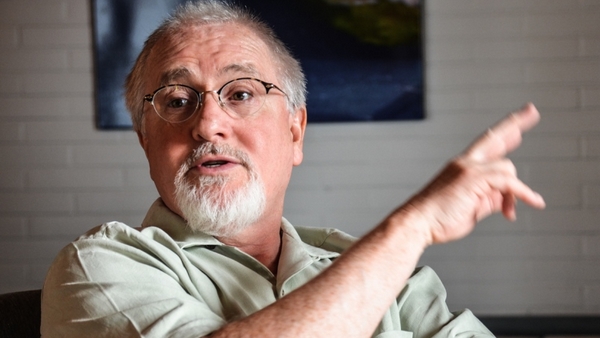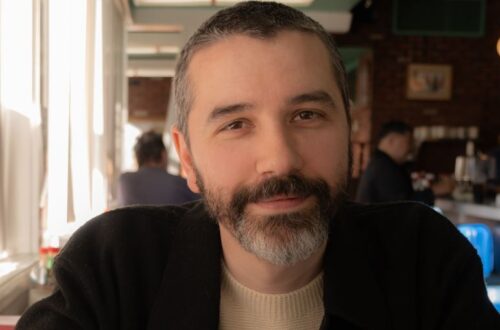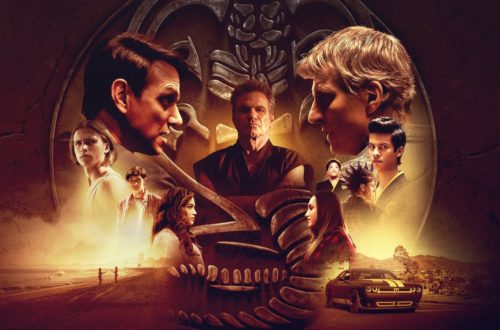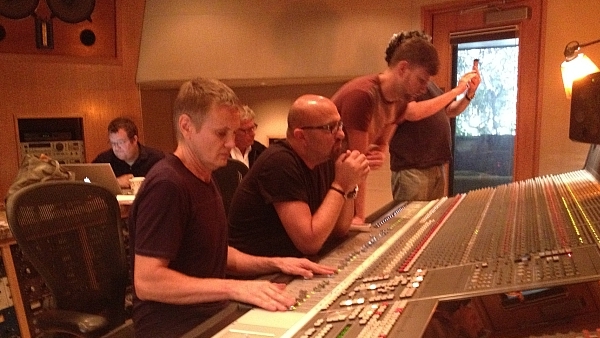 Patrick Doyle has scored over 50 international feature films, including Rise of the Planet of the Apes, Harry Potter and the Goblet of Fire, BRAVE, Indochine, Carlito’s Way and A Little Princess. His work has led to collaborations with some of the most acclaimed directors in the world, including Brian De Palma, Alfonso Cuarón, Ang Lee, and Robert Altman.
Patrick Doyle has scored over 50 international feature films, including Rise of the Planet of the Apes, Harry Potter and the Goblet of Fire, BRAVE, Indochine, Carlito’s Way and A Little Princess. His work has led to collaborations with some of the most acclaimed directors in the world, including Brian De Palma, Alfonso Cuarón, Ang Lee, and Robert Altman.
On July 24, Varèse Sarabande released The Film Music of Patrick Doyle: Solo Piano. The first of two planned albums features original performances and arrangements by the Oscar-nominated composer, the collection features some of Patrick’s most revered compositions performed on piano by Doyle himself. This exceptional album highlights eighteen tracks which include music from Sense and Sensibility, Great Expectations, Nanny McPhee, Gosford Park and Cinderella. Later this year Patrick will travel to the World Soundtrack Awards in Ghent to accept a Lifetime Achievement Award.
We have interviewed Patrick a couple of times before (for Jack Ryan and Cinderella) but it’s always a blast catching up with him. This time we had a Skype call to discuss the album, but I have to say it was very surreal having a laugh with the smiling Scotsman in France while enjoying a sunrise in Texas. In fact, most of the fun talking with Patrick comes not from discussing themes and cues, but other things like life lessons, architecture and having a laugh about feral cats. Enjoy our time with Patrick…we sure did.
GoSeeTalk: Patrick, as always, thanks very much for your time. I realize three interviews inside of two years is extremely selfish, but what can I say, I’m a fan.
*laughs* Thank you Marc. Always great to talk to you. *laughs*
It’s got to be amazing getting the chance to go back and revisit your old themes – your career really is an embarrassment of riches. But had you forgotten about any films you’ve scored once you decided to make this album?
Patrick Doyle: I don’t think any composer forgets what he or she has composed. When you spend so much energy and time and commitment to the project, it’s a great trigger of memories. Music is in the heart. When people hear their favorite song – it’s very evocative. Being a composer, music is a diary of your life. I remember meeting Jerry Goldsmith many, many years ago and I talked to him about the very fine opening to Capricorn One which he composed. He turned to his orchestrator Alexander Courage and it so happened that they had they both had worked together on it and although this was a few years later and when you consider the great body of work Jerry had written, he could still remember that piece of music very clearly. I think that sums up that question. One never forgets.
Like you wrote in the liner notes, these cues aren’t chronological, and your reasoning for that is beautiful. You, of course, played them but I read you left the order to Robert Townson. So are the themes on this album his favorites, or yours?
These are a myriad of thematic material from all the films I have worked on; I’ll be doing a second album from other films and possibly different themes from the same pictures on this one. I haven’t quite decided as yet. Apart from the waltz from Cinderella, which is very current and I’m very, very fond of it, they’re not my ‘favourite‘ themes but rather a collection of themes from films which I greatly enjoyed working on. I could easily have three or four albums as I’ve written a lot of music. *laughs* It takes time and care to arrange these pieces and to get them the way you want them. I’ve been very busy so I have worked on the album in between projects and there are many more tracks to come.
Well if you had to pen up a track list right now, do you think can we get a hint of what might be on Volume 2? Anything from Thor or Rise of the Planet of the Apes? Or are you keeping that secret?
*laughs* Oh, no. There’s no big secret. *laughs* I’ll just wait and see what I feel is transcribable to piano. I haven’t thought too hard about it because there are many other things I have to deal with. These pieces are also accompanied by a publication which is available soon and which needed careful attention.
I remember talking to Steve Jablonsky about how tough it can be to get the studio to release the music in a physical format. But it’s interesting how you are able to give fans this music, in bits and pieces, from the past 25 years.
Well I hope people like it as much as I enjoyed working on it. I have had no problems getting approval from the studios for these pieces, creating other arrangements and releasing the album. Everyone has been very, very helpful and I am very grateful to the studios for all their support and to Disney for giving me their blessing to the Waltz from Cinderella being on the album. It’s been lovely working on it.
Your scores always have a great degree of theatricality, and we’ve talked about your relationship with Kenneth, but what do you find the most fulfilling in those Shakespearean or period-piece kinds of films?
Different historical period films are hugely enjoyable, whether they are set 150 years ago, or 1000 years ago. Especially if you are, as I am, very interested in history. If it’s a great narrative and if the quality of the direction, editing, acting, camerawork and production design etc. are all there, then any composer relishes the opportunity to be a part of it. All these different elements create a style and rhythm that fires the composer’s imagination.
Kenneth Branagh has had a great career and he is at a point where his film choices are his preferences and his has always been my job as the composer to facilitate what he needs. He has proven he is as adept at directing a contemporary piece like Jack Ryan, as he is directing Hamlet or Henry V. In the end it doesn’t matter what the period setting is, it’s my job to be as adaptable to different genres as he is.
What film did you score where you feel you turned a corner professionally? And it’s probably impossible to pick a favorite, but what are you the most proud of?
That’s very difficult to answer as I have had great fortune having worked with some of the most outstanding directors and it has been great fun. I’m also humbled that so many illustrious filmmakers have asked for me to add to their work so identifying a particular
picture isn’t easy. I would have to say that my very first picture was the biggest groundbreaking experience in terms of my career and I am sure the other directors would understand why. I’ll always have a particular fondness for Henry V for it was my introduction to the world of film which was hugely important to me and was also very emotional.
I suppose that any composer’s first film is always a wonderful experience so, for me, to have that experience on a picture that has stood the test of time and is so extremely well thought of that it has become part of film history means a lot to me. The strength and success and longevity of Henry V speaks for itself, composing the score was an extraordinary and cathartic experience.
Whether it is this album, or the others from years ago, can you describe what it’s like to put weeks or months of work into something and then hold a tangible product like an album in your hands?
That thought only registers and comes home to roost after the event. I think one is so busy doing the job that I think it’s a very narcissistic thing to say “this is my album” but as artists we have to promote a product. I like the analogy Kenneth Branagh used one day. He said “If the elephants don’t go down the street, people don’t know the circus is in town”.*laughs* So we have to sell our wares and I need to sell music that people respond to. It’s only afterwards that you
think “ this is really satisfying “ when you view the experience as a whole.
I was invited to attend a concert of my music in Munich where my music was played by the outstanding Munich Radio Orchestra and the Choir of the Bayerischen Rundfunks. They performed a choral piece from Jack Ryan: Shadow Recruit entitled ‘ Faith of Our Fathers’.
Some time went by after this concert in Munich and a friend sent me the link on YouTube as the concert was recorded – I had forgotten this – so when I heard and saw the piece fresh again I was blown away. The piece I remembered was played much slower than I first intended and I thought the choir would never sustain the vocal lines at such a slow tempo, however they were extraordinary and luxuriated in all the phrases transforming the piece. It was extraordinary to hear it once again.
You move on after a project after your work is done and it goes out to the world, in this case to those musicians and conductor and it’s amazing to hear someone else reinterpret your original thoughts. I have discovered over time that you need to let go of your work as much as possible as this next part of the process can be even more satisfying in other peoples hands long after your work is done.
I felt like the luckiest person in the world to have the opportunity to experience my works performed throughout the world by extremely talented performers.
Earlier you said that having something to sell is narcissistic. But what I was looking at is that no matter how great your product is, people outside of the process or industry, whether, like myself, it’s architecture or recording an album, will just never know what went into making it.
Before I start, I create sketches of the main thematic material, and after that I’m fairly industrious and I plough on through the score usually in chronological order. It’s difficult for people to know what other people’s jobs entail and in your case, an architect. To completely understand the journey that takes place from an idea to a finished product – from a concept to physical manifestation –
whether it’s a hotel or an album is difficult for the layman.
Considering the apprenticeship for architecture is, as far as I understand, 7 years, people basically want to trust that a building will not fall down, right? *laughs* You are hired on trust to do a job and as is the composer. Outside ones own sphere its impossible to understand the complexity, the craftsmanship and the need to shadow someone for years, consult with engineers and such until you have the finished product. So when people see a fine building or in my case hear a film score, it should look or sound polished and effortless.
Talking about the architect analogy. I was in a hotel in Los Angeles a couple of years ago and I experienced my first earthquake in the middle of the afternoon. It only lasted 7 seconds but it was quite strong and my room was on the 14th floor of an 18th floor hotel. I felt very confident that even if the earthquake got stronger than it did, the building was very well built. I am no architect but I was confident in this building with the work of the architect. I was relieved that my instinct was right and it was indeed built well and did its job.*laughs*
As someone once said to me, “People hire confidence” and like the architect, my job also has to be confident. It’s always the challenge to remain so.
The album is just beautiful. What it lacks in that symphonic Hollywood punch it makes up for with its low-key but intimate presence. When you got to strip the orchestra away and just get to the essentials, was that more satisfying getting back to just your hands on the piano keys?
I come from a generation that didn’t have computers and I got very used to dealing with the old ways – using music editor sheets. It’s a list of moments in the picture called out to the 100th of a second: when the door opens, when the door closes, when the gun goes off, etc. We print it out at my behest – 5 staves, 3, staves, 2 staves with the beats marked on the page, and it was my job to put the bars in and decide the tempo. The computer made the editorial side of it a lot easier but it was still all written by hand, so I worked at the piano a lot more. I still do to this day when I’m working on themes. But the point of my answer is that I would construct the melody before I ever got to working with the orchestra, so to deconstruct it back to the piano is second nature to me because that’s how I always worked – from the piano up.
What I always tell students is to be aware of the practicality of your instrument – where they sound best, where they resonate best, what tempo they can circumnavigate and to imagine the piano as an orchestra. Literally, if you put a piano on its side, from top to bottom you have your orchestra. So if you’re aware of the strengths of the orchestra it can help you know where you want to take the theme. So when I come up with a theme on the piano, I imagine them expanding throughout the entire orchestra.
Now that you’re getting to play these themes again, do you wish you could have any particular score to experience all over again whether it is working with certain people or just the process of the project?
I would absolutely love to everything all over again. I live for the moment and I enjoy each piece at the time and it’s been my experience that one can in fact go back. I have been fortunate enough that my music is performed regularly, so I get to go back all the time.*laughs* I put my heart and soul into everything I do and am very passionate about my music and I’ve taken the mindset that one must do the very best one can in any set of circumstances. I’m very proud of my work in the past and it has been my best work at the time. I have no regrets.
I’m a great believer in, as my mother would say, “what’s for you, won’t go by you”. It’s a Scottish expression and she’d say it with a little thicker accent than mine. She’d say “wats fer ye, won go by ye” *laughs*.
In terms of looking back I’d say that one has to do one’s own thing. You have to do what your instinct and your happiness barometer tells you. Am I going to have fun here doing this? Can I have control over what I’m doing? If so, hopefully this will help you find what you’re destined to do.
Speaking of having fun, I hate to get away from the album, but how are things going with DreamWorks’ BOO: Bureau of Otherworldy Operations? That seems like a fun project. It’s long been in development, and now in “post-production” apparently. So how’s that going?
Well it is “otherworldly” but also “inoperative”.*laughs* That’s all I can say. *laughs*
What I loved about this album are how amazing themes like “Into the West” and St. Crispins Day” sound on just piano, so I’m really glad to be talking with you this. I’m also, very glad to hear you were interviewed for the upcoming Score documentary which is finally casting a bigger light on film music. You probably can’t divulge too much, but how did that session go?
It went very well. I had a laugh during a few questions so I think my chuckles will be in the capable hands of the editor. *laughs* But I’m very lucky to have been asked and will contribute at any time if it’s towards anything about film music and the art of film.
Safe travels and best of luck taking home that Lifetime Achievement award at the World Soundtrack Awards later this year.
Thank you Marc. All the best to you. Talk soon!
Thanks to Patrick for his time. The album, THE MUSIC OF PATRICK DOYLE: SOLO PIANO was released on July 24 and is available to order now. Find out more info at the official of Varèse Sarabande.


